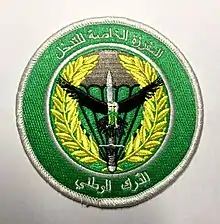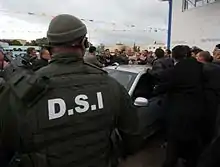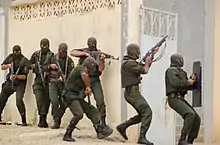Special Intervention Detachment
The Special Intervention Detachment (DSI) is a special forces unit of the Gendarmerie Nationale (Algeria). It specializes in the fight against terrorism, the release of hostages and the close protection of high-ranking personalities.
| Special Intervention Detachment | |
|---|---|
 | |
| Founded | August 27, 1989 |
| Service branches | Algerian Gendarmerie |
| Headquarters | Algiers province |
| Leadership | |
| De facto leader | Abdelmajid Tebboune |
| Chief of Defense | Colonel Abdallah Djebari |
In 2013, it participated in the release of several people during the In Amenas hostage crisis.[1]
History
The DSI was created on August 27, 1989, by a presidential decree. It is elite unit of the Algerian gendarmerie. and the Algerian equivalent of the French GIGN.[2]
It was established to confront the increase in crimes and criminals, especially in its mode of action, as it offers adapted intervention possibilities and additional tactical capacities.
Training
Probationary gendarmes spend a six-month internship with the unit, and after passing the test, at the end of the internship, the best ones will remain in the DSI unit for further training equivalent to 1,400 pedagogical hours.[3] They will also go abroad to train with the major western special forces. They will have to follow intensive courses in all subjects and will be introduced to all the techniques specific to the unit, useful in the accomplishment of their mission.[3] Diving courses, first aid, training courses for dog handlers, parachuting techniques, shooting techniques using explosives and close protection and combat sports (karate, boxing, hand-to-hand combat, armed combat and techniques for climbing buildings or reliefs, bases for the withdrawal of criminals), are on the menu of these daily sessions.[4] They are supervised by real combat sports professionals.[5]
They exchanged with several foreign counterparts, among them the Austrian unit EKO COBRA, the Jordanian Special Operation Forces and the Jordanian Gendarmerie and the French GIGN. The DSI has provided many promotions from African countries; training in intervention and close protection.[6]
The operators are in almost permanent training and each member follows daily training.[4] Shooting training is daily, each member can go to the shooting range whenever he wants. Shooting tests including timed, selective, accuracy, long distance, are evaluated by the instructors of the training cell, most of whom are experienced. The training operations of different scenarios, always with live ammunition, are reviewed and debriefed to correct each action and try to improve its technicality. They also often train at night under night vision on all types of situations in the 13 sites reserved for them. Helicopter-based exercises with recall techniques but also on fast driving and basic techniques in negotiations and hostage-taking. The DSI has provided training in intervention and close protection to a number of elite promotions from African countries.[7]
Missions
The main tasks of the DSI are :[8][2]
- The anti terrorism lutte and the hostage rescue
- The neutralization of criminals or terrorists in various places (urban, forest, desert, mountain...)
- The participation of judiciary police operations
- The escort and transfer of dangerous individuals
- Close protection and escort of VIP's

Organization
The DSI has several spacialized units, the units of the DSI are :[9][7][10]
- Intervention units: assault groups, support groups, snipers
- Operational support units: reconnaissance, observation, listening, jamming
- Combat swim units: amphibious assaults, sabotage, reconnaissance, rescue.
- Close protection and escort units: protection, securing, escort.
- Artificer and deminer units: mine clearance, breaking and entering, technical assistance.
- Canine units: support groups, dog assistance, recruitment and training of dogs.

Main tasks
The DSI has carried out hundreds of operations since its creation, from the release of hostages to the arrest of forcible persons ("neutralization" in the unit's jargon). Some of the most well-known operations include the following:
- Massive hostage crisis in In Amenas (Tiguentourine): On January 16, 2013, a column of four all-terrain vehicles, transporting about 30 heavily armed terrorists, crossed the Algerian-Libyan border, seized the gas complex of Tiguentourine, located 40 km from In Amenas, and took the 800 workers, including 130 foreigners, hostage. The special forces carried out the assault, which resulted in the elimination of 27 members of the terrorist commando, the arrest of three others and the death of 37 hostages.[1]
Equipment
The DSI, like all special forces in the world, has specific equipment for each intervention (helmets, tactical vests, bulletproof vests). The DSI operators are equipped with the latest generation of modern equipment. The DSI is one of the best anti-terrorist units in Africa and the Mediterranean Basin.[9]
Handguns
- Glock 17 in 9 × 19 mm Parabellum, is the visibly most widely used handgun, used by Group divers because of its high water resistance. It is frequently equipped with an Insight Technology M3 LED or M6 tactical light with integrated laser. Modified version in the absence of a safety latch.
- Beretta 92 FS
- Caracal
Machine pistol
Precision rifles
Shotgun
Individual equipment
- Spectra helmet, helmet with bulletproof visor
- Green Tactical Suit, Ghillie suit (Support Sections and Snipers)
- Bullet-proof vest
- Ciras Vest
- Plate carrier vest
- Tactical vest
- Individual transmission apparatus
- Kevlar gloves
- Night vision apparatus
- Balaclava
- Knee and elbow pads
- Holster
- Protective goggles
Vehicles
Terrestrial
- Ford F-150 All Terrain Vehicle with Mobile Adjustable Ramp System (MARS)
- Gendarmerie Nissan Patrol All Terrain Vehicle
- Gendarmerie Toyota Land Cruiser All Terrain Vehicle
- Toyota Land cruiser civil armoured
- Nissan Patrol civil armoured
- Unmarked vehicles
Aerial
- AS355N écureuil Helicopter of the National Gendarmerie
- Agusta-Westland AW-109 LUH Helicopter of the National Gendarmerie
- Mil Mi-17 Helicopter of the Algerian Air Force
- Lockheed Martin C-130 of the Algerian Air Force
- CASA C-295 of the Algerian Air Force
References
- Magazine RAIDS (March 2013). "N°322". RAIDS: 54, 55, 56, 57, 58, 59, 60.
- "Gendarmerie Nationale - Algérie". www.mdn.dz. Retrieved 2020-02-07.
- DSI Forces Spéciales Algérie, retrieved 2020-02-07
- رهيب القوات الخاصة الجزائرية D S I وتدريبها الذي أرعب أعداء الجزائر2017 powerful special forces, retrieved 2020-02-07
- DSI Forces Spéciales Algérie, retrieved 2020-02-07
- "D.S.I : Le Détachement Spécial d'Intervention [G.N] - ForcesDZ". www.forcesdz.com. Retrieved 2020-02-07.
- D.S.I : Le Détachement Spécial d'Intervention [G.N], retrieved 2020-02-07
- Algérie - Détachement Spécial d'Intervention Gendarmerie nationale (DSI), retrieved 2020-02-07
- الجزائر / المفرزة الخاصة للتدخل التابعة للدرك الوطني - DSI Algérie, retrieved 2020-02-07
- Le Détachement Spécial d'Intervention - (D.S.I) - المفرزة الخاصة للتدخل, retrieved 2020-02-07